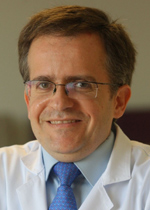Joaquín Baleztena Gurrea, Professor of the School of Medicine and specialist in the Clínica Universidad de Navarra
The challenges of caring for the very elderly
In Navarre society, as in the rest of Spain and developed countries in general, technological and health advances and improvements in living conditions and lifestyles have led to a spectacular increase in life expectancy. If we add to this a leave birth rate, we have as result an aging population.
 Another aspect to be valued is a vision of society in which experience is despised and novelty, youth, and having over being are especially valued. There is therefore a negative view of old age, because the elderly no longer produce and instead consume many resources, so that the society that they themselves have built with great effort, now sees them as a burden and can be considered worthless lives from an economistic conception, leading to a real discrimination based on age, called ageism, which leads to the elderly themselves end up believing themselves a family or social nuisance. Against this, we can promote a human vision of aging, in which each person is considered unique, unrepeatable and irreplaceable. What the person has fades away, but he/she becomes a person. Kant affirmed: "Each thing has a value and only man has his dignity". And precisely, one of the most important human needs is the respect for it and this need does not change when the person becomes more vulnerable, sick or disabled, in fact, it could even be accentuated.
Another aspect to be valued is a vision of society in which experience is despised and novelty, youth, and having over being are especially valued. There is therefore a negative view of old age, because the elderly no longer produce and instead consume many resources, so that the society that they themselves have built with great effort, now sees them as a burden and can be considered worthless lives from an economistic conception, leading to a real discrimination based on age, called ageism, which leads to the elderly themselves end up believing themselves a family or social nuisance. Against this, we can promote a human vision of aging, in which each person is considered unique, unrepeatable and irreplaceable. What the person has fades away, but he/she becomes a person. Kant affirmed: "Each thing has a value and only man has his dignity". And precisely, one of the most important human needs is the respect for it and this need does not change when the person becomes more vulnerable, sick or disabled, in fact, it could even be accentuated.
Social, economic and family transformations are leading to an increasing number of elderly people living alone. Loneliness may entail inherent risks: security, money management, difficulty in following a good diet, etc., and if the deterioration progresses, the need for permanent care may overburden the family, the main support of the elderly. Precisely to that family that in many occasions they themselves have previously taken care of.
All this triggers a greater demand for services, because as age increases, so does the risk of suffering from chronic diseases and situations of dependence, loneliness and loss of autonomy, which must be addressed through a commitment by society as a whole with the subsidiary support of the relevant authorities, to provide care and programs that respond effectively and with the highest quality to this demand.
In this status, care for the very elderly should be a priority goal in health and social services and, in general, in our society, increasing coordination among all of them. Quoting Dr. Marjorie Warren, one of the pioneers of Geriatrics, said as early as 1946, that "There is no doubt that these patients have been inadequately treated in the past and often continue to receive inadequate and scanty care, if any. The medical profession, having succeeded in prolonging the life of man, must no longer fail to assume its responsibility for the sick or feeble old man. A change of attitude in the care of the chronically ill is urgently needed." After 70 years, this quotation is still food for thought and serves as a spur to further progress in gerontological care. Currently, in developed countries, the promotion of services and benefits for the very elderly should be oriented primarily not so much to increasing the number of years of life, goal merely quantitative, as to development of actions aimed at promote healthy aging, i.e., to achieve more years free of disease, disability and dependence.
And this involves aspects such as: the promotion of a specific training in geriatrics and gerontology to all professionals who care for the elderly, the development of the research in the elderly and greater support for family members and caregivers. Likewise, it is necessary to prevent loneliness, to transmit socially a positive vision of old age as another stage of life that can also be enjoyed within individual possibilities. And to move towards an integrating model , which addresses all the dimensions of the person (biomedical, mental, social, family, spiritual, etc.).
Technical advances, which are a good thing, if not accompanied by the more human component of care for the elderly can lead to providing a poor quality attendance and frustration for the teams caring for them. It should never be said that nothing more can be done. In addition to curing and rehabilitating what is reversible, we must treat symptoms, accompany, soothe, relieve, care, provide affection and understanding. At final give them a dignified attention until the end of their life.
